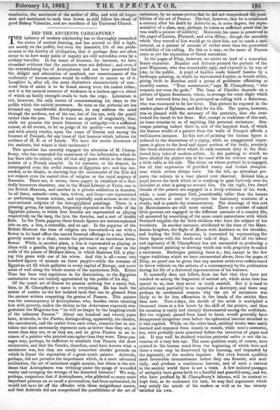VALENTINES.
VALENTINE'S Day, like many other old days, is going out of fashion. Valentines no longer possess a charm for society. Custom, in this respect, has long since undergone a change, which is a very common one. In the days of our grandfathers and grand- mothers, when Sir Roger de Coverley and romping were not un- known—in country-houses at least; when gentlemen clinked glasses with fair friends; when the mistletoe sanctioned what modem mistletoes never see now-a-days, except in servants' halls; and when the reigning beauty of the season was also the reigning toast, St. Valentine's Day afforded a fashionable excuse for overleaping the little barrier which ceremony placed on ordinary week days between the two sexes. The fashionable world since those times has shrunk into its shell. So long as rustics were always obsequious, and stood, hat in hand, at a proper distance from their superiors, their superiors were not unwilling to pretend for the nonce to be rustics too. The -difficulty always is to break down reserve for one's acquaintances and friends, without at the same time encouraging outsiders to presume. In the last century, the difficulty was not so great. Snobs and snobbery—if one may coin the word for the occasion—have chiefly come in since mail-coaches have gone out. A lady of quality might safely pretend to be a shepherdess, and give herself both Arcadian airs and a very Arcadian dress, without any fear that the real shepherds and shepherdesses would be rude to her, or that the sheep would not remember to keep their distance and not to presume upon the condescension. The French revolution put an end to shepherdesses. Mimic pastoral life became disagreeable when Colin Clouts became disrespectful; and intolerable as soon as the lower classes, aping the affectation of the upper classes, took it into their heads to adopt al ,fresco life and customs in imitation of their betters. A lady and gentleman may, perhaps, be sometimes trusted to lay aside fashions without laying aside delicacy. But it is only those whose personal dignity is the result of long habit and education who can be uproarious and delicate at once. The Lord of Misrule is endurable when his boisterous subjects never forget for a moment their inbred reserve and dignity ; but with many people dignity and reserve are too fictitious and conventional to last long when the fictions of conventionality are withdrawn. Much delicacy is required to romp without offending self-respect ; and romping becomes im- possible in mixed company.
It is no wonder, then, that conventionalities are seldom abandoned in these days, and that people take fewer opportunities of breaking through the restrictions that are both useful and agreeable in ordi- nary life. It is pleasant to pie-nie in the solitude of rural scenery, but it would not be pleasant to pic-nic on Sundays upon Greenwich- hill. The view is a very fine one, and it is quite open to moral phi- losophers to observe that our pleasure ought, if possible, to be increased by the proximity of a few thousand happy fellow-creatures. Penny buns are not unwholesome, though they are unsatisfactory food; in a fit of extreme hunger they might possibly be eaten by an epicure; and it is an established fact that they are continually devoured by school-children without apparent reluctance. But what makes a School feast so remarkable a sight, is that the pleasure of none of the infant banqueters seems to be damped by the fact that they are feast- ing and. enjoying themselves in a crowd. Dislike to be overlooked in one's hours of social enjoyment is a feeling that is the result of our particular English education ; and there can be no doubt that in spite of our increasing habits of travelling we are not losing it. Nothing in the world is so little cosmopolitan as an Englishman. This is owing partly to a morbid self-consciousness, but is partly, beyond all question, owing to a fine feeling of reserve. Valentines and mistletoes and clinking of glasses accordingly become unpopular with most educated people as soon as the custom grows vulgar—that is to say, as soon as it is taken up by a large class who have not the tact to prevent fun and freedom from becoming offensive. It is not merely that we dislike doing what the crowd does. Such a feeling of exclusiveness is natural, no doubt, to many people, but it would be 'unworthy if the crowd to whose company and imitation they objected were as refined in heart as they themselves. But unhappily what we wish to see done with instinctive delicacy some offenders will do coarsely and stupidly. We leave off our happy uneonventionalities because we are disgusted to see the cause of unconventionality profaned and disgraced. It is the old fable over again. Diana and her nymphs gave up bathing in their mossy water-pools when vulgar mortals began to bathe there too.
If only vulgar people knew of how much pleasure they rob the world by making innocent pleasures vulgar 1 The comic tendency of the age to see the vulgar side in everything, even in pathos—a ten- dewy fostered, we are sorry to say, even by the greatest comic writers of the day—really depriies us of pure and worthy delights. There is nothing necessarily offensive about the pathos and the strong feeling that occasionally comes uppermost in vulgar natures. A common humanity—God be praised for it—binds all of us to- gether as brothers and fellow-Icasters at the mysterious ban- quet of human life. The loves and the sorrows of these fellow- creatures, whose cultivation is less high than our own, have nothing in them that is necessarily common-place. Life, if comedians and satirists could only let it alone, and treat it reverently at the right moment, is a grand poem, wherever it is found. Even the Bob Sawyers are not vulgar in their hours of deep feeling, until they are told that they are vulgar, and begin to learn it, and to be proud of it. We cannot help thinking that Mr, Dickens, with all his genius and his power of sympathy, has something to answer for. He has made it difficult for Bob Sawyers to be serious without being ridiculous. And the mob who is so loud in his dress, and his manner, and his gestures, at a moment of social relaxation, is unconsciously doing more mis- chief than he means. He is making many lookers-on hate and abhor social relaxation altogether, as they never feel safe from being jarred upon by inconsiderately offensive people at such times. A drunken satyr seems to have broken in upon the happy scene ; and the individual who mars enjoyment very often is not so romantic-looking even as a satyr.
Valentines, then, are passing out of date, because it has been found that their use, and the use of such harmless pleasantries cannot be con- fined to the circle of those who are certain never to misuse them. Nothing can be more thoroughly certain than that an accomplished and polished person could be trusted to send as many valentines as he pleased. A gentleman of fine feeling might write as many playful verses as he chose to a delicate and noble lady, without making her sensible, either that he was paying her unnecessary attention, or that he was anxious to win her heart, or that he had the presumption to wish to stand to her in any particularly intimate relation. Under all the apparent ease and freedom of the thing, it would be quite clear that he never meant to put her in a position in which she might not happily stand, if all the world were looking on. But there are very few of whom anything like this could be said with truth; and in social matters it does not answer to make experiments. So St. Va- lentine, by common consent, has been relegated to social exile. His fol- lowers have become as socially unorthodox as the Valentinians of other days were theologically heretical. The loves of the finches and the thrushes are poetical and romantic in their way; but when appren- tices and shop-boys have intruded into the sportive festivities of the day, everybody pretends not to notice that the birds and the shop- boys are making love to their respective valentines, after a very overt fashion. The world is changing and hardening. Valentines are only bandied to and fro in these latter years by the knight and the dames of the till and of the counter. There are no Queens of the -May—we observe with similar regret—to be found anywhere except among chimney-sweeps. We should view the decay of the old custom with more sorrow if the classes who still practised it mixed up their practice of it with less buffoonery. There is no harm in a valentine, but rather good, which gives a maid-servant or a household drudge a brief hour of sunshine ; and if valentines always were courteous and well meaning, it would not matter much if they were rough. If the valentines of the shop- windows are to be taken as average specimens of the many epistles which pass through the post-office on St. Valentine's Day, we cannot say much for the ancient prelate's modern worshippers. To judge by the specimens, a valentine might generally be defined to be an offen- sive and vulgar piece of insolent familiarity addressed to young mil- liners and maid-servants. This is not as it should be, and certainly not as it always was. In this, as in other things, the inveterate love of quizzing and of the grotesque has driven out delicacy of taste and self- respect. We can only hope that most of the productions upon view are not to be sent to the fairer sex. We cannot help suspecting, however, that their purchasers are not likely to be so nice. The charm of the old custom lay in its simplicity and its elegance. That charm is lost as soon as the custom is turned into a pre- text for mere rudeness_ On the whole, it may be probably said with truth that those use the privileges of St. Valentine's Day least who could be most safely permitted to we them. People of sense and good feeling, whatever their station in life, are not the people who are most anxious to avail themselves of a conventional privilege. Nobody cares to be kissed or to kiss in a promiscuous way under the mistletoe. There would be very little enjoyment in it, and that of a kind not likely to be popular with sensible men and women. It is an enjoyment which poets and novelists tell es that gentlemen of the old regime used to be fond of, but we cannot help thinking that the poets and novelists must be mistaken. Such boisterous ceremonies are never likely to have been agreeable to that sex which has to bear the brunt of the advances of the other, and what is distasteful to women of refinement, soon becomes dis- tasteful to men who wish to see women who are with them and in their charge thoroughly happy, secure, and at ease. There is certainly very little that is chivalrous about valentines. Still, we do not wish to be severe on those who thick otherwise, and we quite. allow that a good deal of latitude ought to be admitted in the case of cousins. And for all those who still find pleasure in St. Valen- tine's Day, we do not know that we can do better than repeat, in
conclusion, the sentiment of the author of Ella, and wish all happi- ness and merriment to such true lovers as-still follow the ritual of good Bishop Valentine, and are members of his Universal Church.































 Previous page
Previous page